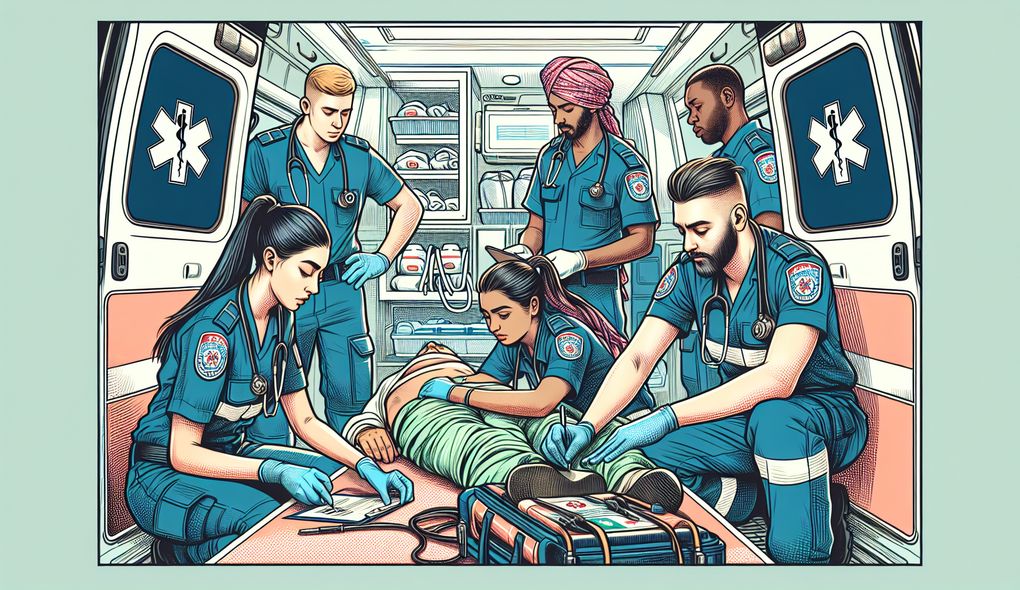How do you handle situations where you encounter language barriers with patients?
INTERMEDIATE LEVEL

Sample answer to the question:
When I encounter language barriers with patients, I try to find alternative ways to communicate. For example, I use non-verbal gestures, such as pointing or nodding, to convey important information. I also carry a pocket-sized language translation book with me to help in simple communication. If the situation is urgent and requires immediate action, I prioritize the patient's safety and take necessary steps without wasting much time on communication. However, I always try my best to find someone who can act as an interpreter, such as a family member or a bilingual colleague, to ensure effective communication and provide the best possible care.
Here is a more solid answer:
When faced with language barriers, I employ a variety of communication strategies to ensure effective patient care. Firstly, I rely on non-verbal cues such as gestures and facial expressions to convey important information and provide reassurance. Additionally, I carry a smartphone equipped with translation apps to facilitate communication in basic, urgent situations. In more complex situations, I make an effort to find a professional interpreter or bilingual staff member to ensure accurate comprehension and avoid misunderstandings. For example, I once encountered a patient who only spoke Mandarin, and I quickly located a Mandarin-speaking nurse to assist in explaining the treatment plan. This collaborative approach not only improved communication but also enhanced the patient's trust in their care. Overall, I prioritize patient safety and adapt my communication methods to overcome language barriers and provide the highest quality of care.
Why is this a more solid answer?
The solid answer expands on the basic answer by providing more specific details and examples of the candidate's experience in handling language barriers with patients. It demonstrates the candidate's effective communication strategies and highlights their ability to adapt and collaborate with other healthcare professionals to overcome language barriers. However, the answer could be further improved with additional examples and a discussion of the candidate's understanding and respect for cultural differences.
An example of a exceptional answer:
In situations where language barriers arise with patients, I approach each encounter with empathy and a commitment to delivering the highest level of care. To facilitate effective communication, I utilize a multi-faceted approach that includes non-verbal cues, translation tools, and collaboration with interpreters. For instance, during a recent emergency call, I encountered a patient who spoke only Spanish. Recognizing the urgency of the situation, I employed clear non-verbal gestures combined with simple Spanish phrases that I had learned. This allowed me to assess the patient's condition and provide immediate vital care. However, I also recognized the importance of obtaining accurate medical history and ensuring proper informed consent. To address these needs, I contacted our language services department and requested a professional interpreter to assist throughout the treatment process. This collaborative effort ensured precise communication and fostered a sense of trust and comfort for the patient and their family. Reflecting on this experience, I continue to seek opportunities to enhance my language skills, such as attending medical Spanish courses, to better connect with patients from diverse backgrounds and further improve their healthcare experiences.
Why is this an exceptional answer?
The exceptional answer goes above and beyond by demonstrating not only the candidate's ability to handle language barriers effectively but also their empathy and commitment to patient care. The answer provides a specific example of the candidate's resourcefulness in using non-verbal cues and simple language phrases to provide immediate care. It also highlights their recognition of the importance of accurate communication for obtaining medical history and informed consent, leading to the collaboration with a professional interpreter. Furthermore, the answer mentions the candidate's willingness to further enhance their language skills to better connect with patients. Overall, the exceptional answer displays a comprehensive understanding of the challenges associated with language barriers and showcases the candidate's dedication to delivering culturally competent healthcare.
How to prepare for this question:
- Familiarize yourself with commonly used non-verbal cues and gestures to effectively communicate with patients who speak a different language.
- Utilize translation tools and language apps on your smartphone to assist in basic communication.
- Be proactive in seeking out individuals within the healthcare team who can act as interpreters or have bilingual proficiency.
- Consider attending language courses or workshops to enhance your communication skills and cultural competence.
- Stay open-minded and embrace cultural diversity to build trust and rapport with patients from various linguistic backgrounds.
What are interviewers evaluating with this question?
- Effective communication
- Ability to work under pressure
- Problem-solving
- Interpersonal skills

